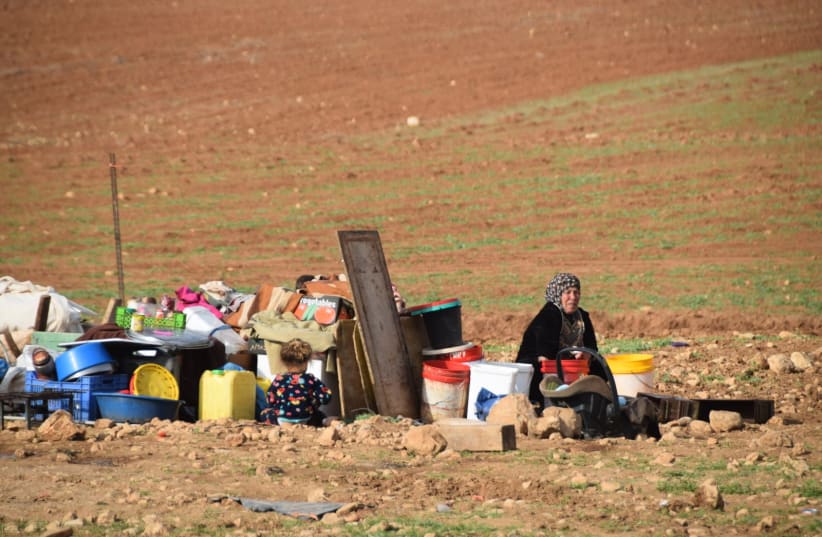The Civil Administration attempted to raze tents in the illegal Palestinian herding village of Khirbat Humsa twice in one week.
The Civil Administration initially destroyed a small village of 18 tents and modular structures located in the Jordan Valley in November, housing 11 families, according to the left-wing group B’Tselem.
It returned again on Monday to remove 13 tents which the families had rebuilt, as well as shacks and tents for livestock, B’Tselem reported.
The families returned to the area, as did the Civil Administration, which on Wednesday, removed 7 tents that housed nine families, as well as tents and shacks for livestock.
It also confiscated four portable toilets and destroyed another two, as well as confiscated material for three additional tents, according to B’Tselem. The IDF also confiscated two vehicles, one that belonged to a Palestinian human rights activist and another that belonged to the Palestinian Authority, B’Tselem stated.
The Civil Administration said that the village had been illegally built in an IDF firing zone. It explained that it had met with residents of Khirbat Humsa prior to Monday’s evacuation, described how dangerous it was to live in a firing zone and offered to relocate the families to another area.
On Monday the residents initially agreed to the relocation and their structures and equipment were dismantled and loaded onto trucks, the Civil Administration said. The Palestinians then changed their mind and refused to leave, it added. At that point, the equipment was confiscated.
The Civil Administration returned on Wednesday to remove structures that had been erected again at the site since Monday.
According to B’Tselem, the Civil Administration returned again at night, to once again confiscate equipment from Palestinian families who had returned and declared the area a closed military zone.
Separately the IDF held a drill in a firing zone in the South Hebron Hills region of the West Bank’s Area C.
As the IDF passed by the village of Jenbah. The IDF damaged the entrance of a cave, trampled some fields and broke a power line that serviced a mosque and a clinic, according to B’Tselem.
South Hebron Hills Regional Council head Yochai Damri lauded the IDF decision to hold the drill, explaining that it made an important statement with respect to Area C.
The South Hebron Hills Council said it was the first such drill in a while and that Damri had spoken with the IDF about the importance of such drills, particularly in light of attempts by the Palestinian Authority to build illegally in Area C and in the South Hebron Hills region in particular.
“We’re working on all levels to prevent the abandonment of Area C,” Damri said.
